“My mission is to bring faith to the faithless, and doubt to the faithful.”
- Paul Tillich
It’s unfortunate that the term “unhinged” has mostly a negative connotation. We would all do well to become unhinged every now and again. As a verb, “unhinged” is defined as: “to be disturbed in mind, made uneasy, or cause to be worried or alarmed.” At times we need shaken and rattled.
In Fahrenheit 451 Ray Bradbury wrote:
“We need not to be let alone. We need to be really bothered once in a while. How long is it since you were really bothered? About something important, about something real?”
Unhinged can also mean: “to remove the hinges from.” Some of us need to remove the hinges that attach us to limiting and sabotaging beliefs, mindsets, narratives, ideologies, scripts and expectations. I’m often aiding people in becoming unhinged from toxic religious dogma.
As an adjective, “unhinged” means: “affected with madness or insanity.” Aristotle wrote, “No great mind has ever existed without a touch of madness.” The saying suggests that true genius and creativity often involve unconventional thinking, a willingness to challenge norms, and a capacity to explore ideas that others might dismiss as impractical, blasphemous or absurd.
I distilled “6 dangerous questions” for consideration, based upon the 250 articles I have published in the year and a half I have been on Substack. I refer to them as “dangerous” questions because they are likely to cause angst and discomfort.
Are some questions too dangerous to ask? Who decides which ones? What happens if you ask them?
The 6 dangerous questions are genuine questions that I am asking and exploring. I have thoughts on them, but they are works in progress without definitive answers or concrete conclusions. Some of the questions may seem startling and perhaps even offensive.
Socrates taught, “One good question is better than a thousand answers.” A good question can be transformative by challenging assumptions, encouraging deeper thinking, revealing underlying causes, and fostering self-discovery. I’m not claiming my 6 questions are “good questions”; only that they have become questions of great interest to myself.
But first a brief story about what led me to Substack and these questions.
A long time ago in a galaxy far, far away…
A Short Story
In 1998 I was done with religion. Like Bilbo Baggins’ disappearance, it was a dramatic farewell. I disappeared myself from the Christian faith and my megachurch ministerial career. My personal identity, social network and financial security went up in smoke. My longstanding seminary-constructed theology and existential security collapsed like a house of cards. A celebrity of Christendom doesn’t walk away easily. I was publicly condemned, scorned, shamed, vilified, and written off by the Christian establishment. You can read the full story in my article, Confessions of an Ex-Megapastor.
This was back in the day before “religious deconstruction” and “religious trauma” were a thing. I stumbled my way forward on my own, losing more and more of my religion and theology as I went. It was lonely.
After leaving religion, I went off the grid and immersed myself in the suffering of the world. I worked an assortment of low-wage jobs, which shifted my relational world from Starbucks and Whole Foods to the working poor and immigrants. It just sort of happened that I started helping an Iranian man improve his English. He invited me to his one-bedroom apartment with his wife and infant, and we started doing weekly English lessons. Word got out. By the third week, his front-room was packed with people, wanting help with English.
Having left behind my pastoral career, I transitioned my vocational direction from church ministry to the non-profit world. I became the Executive Director of a social services agency in my city that works to empower families and communities in poverty through education, workforce development, and systems change. The goal was to create lasting economic stability and well-being, and generational transformation. This experience taught me the necessity of addressing basic human conditions (such as economics, housing, and education) in order to achieve fundamental and lasting change. This week I published an article related to these matters by examining the work of Karl Marx and his critique of capitalism as inherently exploitative.
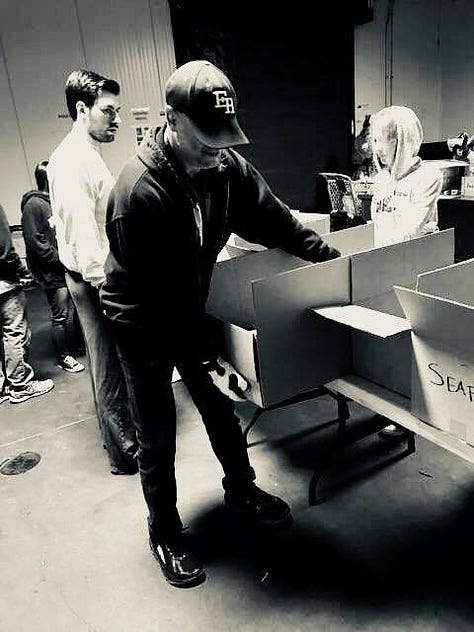
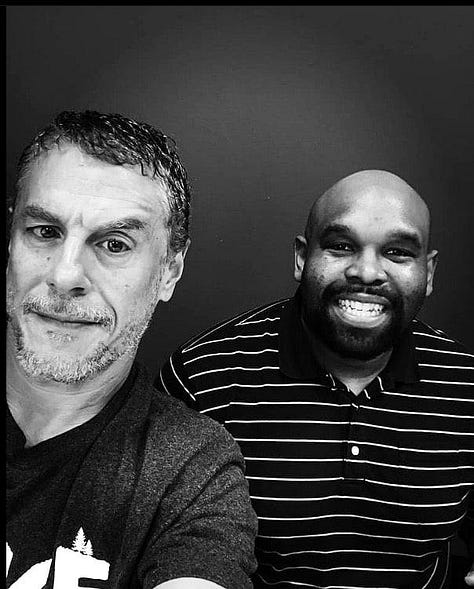
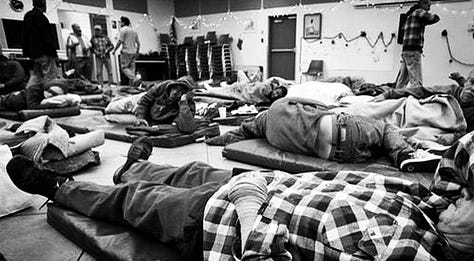
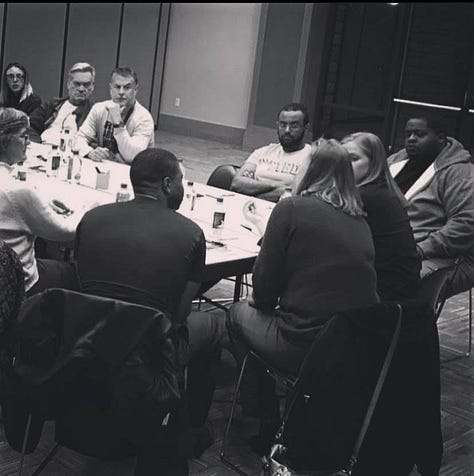
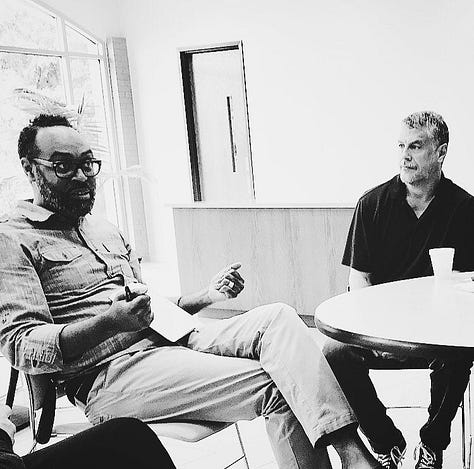
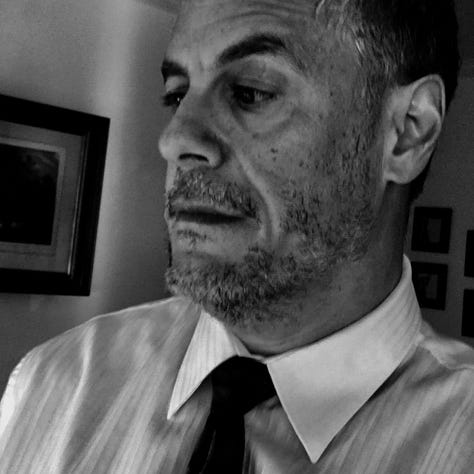
Through this work I came into contact with an international human rights organization, based in Washington, D.C. I accepted the position of U.S. Director of Education, which meant traveling abroad to investigate cases of forced child prostitution and child slave labor. I posed as a sex tourist in brothels, and an investor in child slave labor camps in SE Asia, providing intel for paratroop deployment raids and rescues. I spoke at universities and conferences across the U.S. about human rights issues. These experiences deeply shaped the person that I am today, which I share in more detail in my article, Why won't God stop evil and suffering? Sex, Lies and Paratroop Deployment.
Meanwhile, I had started blogging about my post-religion life and journey, which stirred great public interest. An editor at a major publishing house contacted me about the possibility of publishing a book. It was never my intent to become a published author, but I published six books, the first in 2005.
Controversy seemed to follow me into my writing career. A major Christian publisher offered me a two-book contract. After reading the manuscript for the first book they accused me of heresy, refused to publish the manuscript, promptly cancelled my book contract, and pulled all my books from the their nationwide chain of bookstores. Rob Bell was in the same boat and we became friends.
My email Inbox blew up with people contacting me about their struggles with religion. It practically became a full-time job, responding to these inquiries. I agreed to do a Skype call (this was before Zoom) with a religion-leaver, and before I knew it these calls exponentially multiplied. Eventually this consumed all my time, and I started a professional counseling practice for spiritual abuse and religious trauma victims, and religion-leavers who were working through their deconstruction process. I discuss the difference places people often find themselves after leaving religion in my recent article, Love Letters to the Recently Departed: An Ode to Those Done with Religion.
For the next several years I invested over 40,000 hours working with individuals and groups in religious deconstruction, compiling research and developing frameworks, models and methods to support and guide people in recovering from religious damage, cultivating existential health, and creating of a meaningful non-religious spirituality. This was well before SBNR was a thing and Nones burst onto the scene. I realize that “existential health” isn’t a common term. I discuss it at length in my article, The Rules of the Game: What We Won't Talk About is Killing Us.
As the story goes, I became known as something of an “expert” on religious deconstruction and traveled across the U.S. to speak at professional therapist associations, events and conferences about religious trauma, spiritual abuse and belief-system deconstruction, something most therapists at the time didn’t feel comfortable addressing with clients and patients.
During these years I became a Certified Spiritual Director, founded the Nashville Humanist Association, and was a Chaplain with the American Humanist Association. I created courses, programs, support groups and retreats for religious deconstruction, existential health and spiritual reconstruction. This led to my founding the Center for Non-Religious Spirituality (CNRS), which includes a training and certification course for Non-Religious Spiritual Directors, Religious De/Reconstruction Counselors, and EXiHealth Practitioners. If you’re interested, you can read more about this work in my article, The Spiritual Emergency: Can we solve the meaning crisis before it's too late?
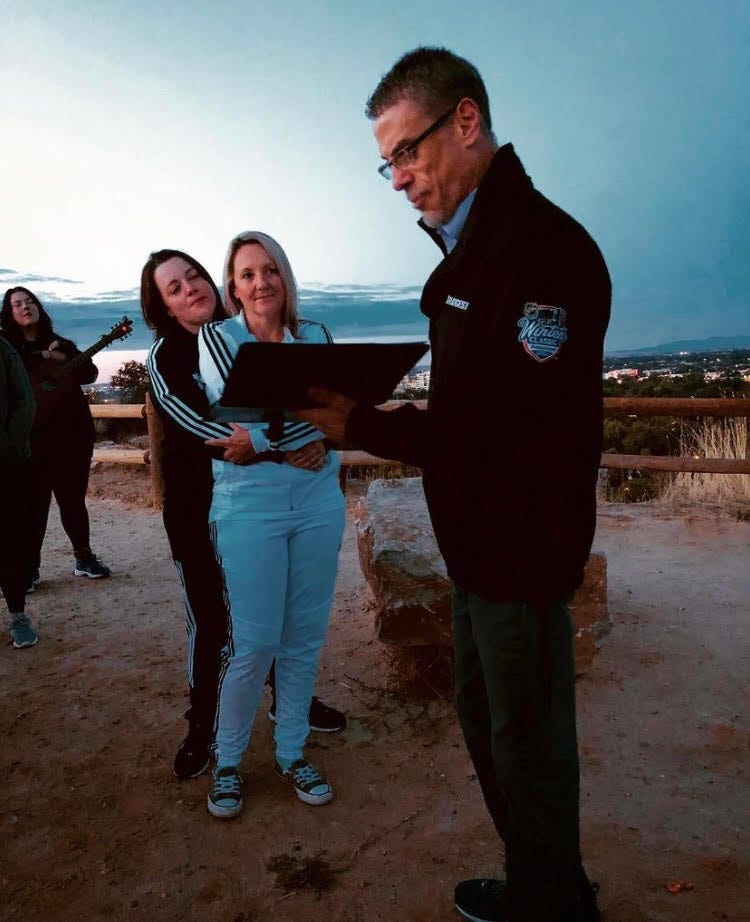
Along the way, I have been an adjunct professor of ethics, comparative religion, and the philosophy of religion. My undergraduate degree is in journalism, and my graduate degree in theology. Despite my formal education, it has been two personal commitments that have fueled my growth and development. The first has been my dedication to self-learning, also known as autodidacticism, across a wide and diverse spectrum of fields of knowledge and experience.
Collaboration has been the second catalytic component of my personal growth and professional development. The CNRS training and certification course is the only one of its kind in the world, partly because of its multidisciplinary framework. It took decades of research and collaboration to create and curate the curriculum from a wide spectrum of fields across the natural and social sciences.
Substack has been a vital collaborative space for me. I am deeply indebted to countless people I have met on Substack who have unknowingly became my teachers through their life experiences, professional expertise, profound wisdom and humanity, and unique lens through which they see the world. I feel like one of the most important contributions I make to my subscribers is introducing them to the work and writing of so many extraordinary people I encounter here. This is why I often publish articles such as: The 20 People You May Not Know, Be the Explorer, and Remembering the Legacy of Helen De Cruz.
I have been active on social media over the years, but made the decision to join Substack and named my newsletter, Deconstructionology. I haven’t been motivated to publish more books, but there is a lot that has transpired in my personal evolution and professional work that I have not written about publicly.
In a year and a half on Substack I have published 250 long-form articles, covering a spectrum of topics related to areas such as philosophy, religious deconstruction, existential health, non-religious spirituality, radical theology, systems theory, and societal transformation. At the end of my first year on Substack, I rounded up my first 200 articles and organized them into, The Deconstructionology Encyclopedia (Volume One), which is the equivalent of 700,000 Words, 11 Books... and countless pots of coffee.
As mentioned, I train others in the work of religious deconstruction and existential health counseling. Over a decade ago I saw the meaning crisis looming on the horizon through my work involving the mass exodus from organized religion, and widespread loss of faith in religious belief-systems, cultural narratives and societal institutions.
The original group who completed the certification course years ago were three people. The upcoming training course in August has 60 individuals enrolled from all over the world, many who bring their own professional background in the mental health and human development fields. We closed registration at 60, and have a long waitlist for the next training. The course is also being piloted by a group of accredited universities in their graduate programs.
The growth of the Center for Non-Religious Spirituality and demand for this training and certification course, led me to seek help in creating new organizational systems and infrastructure to support and expand the work. Until now, the Center and all it’s programs and initiatives have been created and managed by individuals who have volunteered their time, effort and expertise. Without them, none of this would have happened. This includes Amy who has used her skill set and expertise to support the effort, amidst her own professional work and writing.
There are times when I step back, reflect upon my work, and remind myself why I am doing this. I’m interested in radical change and revolution. Yeah I know; sounds pretty grandiose. The word “radical” originates from the Latin word “radix,” meaning “root”, while the the term “revolution” took on the meaning of fundamental societal transformation. What interests me is addressing the root of what prevents individual, collective, societal and planetary flourishing, and forging new regenerative paths forward.
I don’t consider myself special or more important than anyone else because of these interests. I could have just as easily been a marine biologist, criminal investigator, high school football coach, musician, farmer or software engineer, and made my unique contribution to the world in those worthwhile and meaningful ways.
Conducting an orchestra is an expertise and skill all its own, but it would be meaningless without the talent of the individual musicians and their ability to make music together. I often feel like an orchestra conductor who lucked out with a lot of extraordinary musicians who know how to play together.
Dangerous Questions I’m asking
What follows are dangerous questions I am currently pondering. So far I have six, there of them I will discuss today, the other three next week. There could be more.
Ancient Greek playwright, Euripides, wrote:
“Question everything. Learn something. Answer nothing.”
Let’s break it down:
Question everything:
This part encourages skepticism and a willingness to challenge assumptions, even those that are widely accepted.
Learn something:
The act of questioning should be driven by a desire to understand more deeply and acquire new knowledge.
Answer nothing:
This aspect suggests a commitment to ongoing inquiry and a refusal to be satisfied with superficial or incomplete answers.
A few examples of “dangerous questions” might be:
Did human beings invent “God”?
Is “progress” a myth?
Are Homo sapiens capable of attaining true knowledge?
Is Democracy the best form of government?
Are free will and human agency an illusion?
Is there any inherent meaning to life?
Are there moral absolutes?
Is there conscious life after death?
Will our species become extinct?
In my opinion, these are useful to explore, not to arrive at a definitive “yes” or “no” answer, but to reflect upon the themes inherent in the questions. For example, take the question, “Are Homo sapiens capable of attaining true knowledge?” You could break down this question into several areas for investigation, such as:
What is knowledge?
What faculties and processes do Homo sapiens use to acquire knowledge, and how reliable are they?
What are the limitations of human knowledge?
On what basis does one determine if something is “true” or “false”?
What is the difference between “knowledge” and “belief”?
Is knowledge objective or relative?
What is the role of language in shaping our knowledge?
Or consider the question, “Is “progress” a myth?” How should “progress” be defined and measured? I never questioned the idea that human history tells the story of progress and advancement. Reading Michel Foucault changed that quite quickly, which I discuss in an article I published about him, Is the idea of "progress" a farce?
With all this in mind, here are my first three dangerous questions I’ve been pondering lately.
1. Should the word “God” become obsolete?
According to Oxford Dictionary, there are 47,156 words considered obsolete, and have fallen out of common usage in the English language. For example, the term “lunting” is no more; it meant taking a relaxing stroll while smoking a pipe. “Crapulous” is gone too; the term “hangover” replaced it. My question is: Should “God” be added to the list of obsolete words, making it 47,157?
The phrase “I can't unsee it” means that once you’ve seen something, particularly something shocking, disturbing, or unusual, you can’t erase the memory of it from your mind. I often feel this way about the word “God” - you can’t unthink it.
Inherently implied in the term “God” is the idea of a Big Other. An obvious example would be Christian monotheism - “God” is the supreme being, creator of the universe, and oversees the course of history according to His divine plan.
It’s less obvious but still present in panentheism, which identifies something identified as “God” and something that is not. Panentheism posits that the universe is within God, and God is also greater than the universe. It’s a middle ground between theism (God is separate from the world) and pantheism (God is identical to the world). Essentially, panentheism suggests that God is both immanent (present in the world) and transcendent (beyond the world). But like monotheism, panentheism still requires a thing termed “God”.
It’s nearly impossible to unthink “God” as a proper noun and a Big Other. Even if you imagine God not to be a static thing (noun) and more like a dynamic process (verb), you still have something distinct that you are calling “God”. One way out of this is to simply call it something else. Substitute words (source, universe, higher power, universal energy, etc.) have there own challenges, especially if the concepts still ascribe special and exclusive attributes to the reality it is referring to.
For me, the issue at hand is whether there is something beyond you and I individually and collectively, beyond the natural universe, something supernatural in nature, which we can identify with a noun. And more specifically, if there is, is the word “God” the best word to name it.
It’s a stretch to ask people to unthink religion from the word, “God”. Religion has branded the conceptualization of “God” into the collective conscious. Dutch philosopher Baruch Spinoza did a good a job as anyone in attempting to un-God “God”, but even he confused everyone by insisting upon the term to identify his philosophical monism. I previously published an article on Spinoza’s God.
What would be the rationale for the obsolescence of “God”? A few might be:
Science offers explanations for the universe and life that do not rely on the existence of a supernatural Big Other “God”.
Philosophical critiques reveal the inherent and irreconcilable inconsistencies, contradictions and irrationalities of the dominant conceptions of “God”.
The concept of “God” can be a source of conflict and intolerance, as different religions and interpretations of “God” can lead to divisions and hostility.
Universal values and ethical principles, rather than supernatural dogma associated with the concept of “God”, would lead to a more peaceful and inclusive society.
God as supernatural Big Other disempowers human responsibility, agency and accountability because God is seen as the prime actor in history and human affairs.
Keep in mind that this question is not meant to dissuade belief in transcendent or ultimate reality, but is questioning the word “God” insofar as it points to a Big Other separate and supernatural entity. I discuss this further in my articles, Is There a God Beyond God? and The Post-Religion "God" Dilemma.
This topic has also come up in my writings on Christian Atheism, such as, Can Atheism save Christianity? I also published a series of articles - one series on science and religion, another on the psychology of religion, one on the anthropology of religion you might find useful on this topic.
I think most people would agree that there is a lot of baggage associated with the word “God”. Rather than actually discussing the realities that the term “God” is pointing toward and opens up (nature of reality, life’s meaning, human mortality, worldview, morality, etc.), we get hung up on the word itself. Some people become so attached to their “God”-concept to the point of division, animosity, hatred and violence.
It’s hard to imagine the word “God” becoming obsolete, and it may be the one word that absolutely never would. We can do without “lunting”, but erasing “God” from the English language seems unlikely.
Prince was referred to as “The Artist Formerly Known as Prince” (or TAFKAP) because he legally changed his name to an unpronounceable symbol in 1993 during a contract dispute with Warner Bros. Records. But I don’t think it would work too well to come up with “The Ultimate Reality Formerly Known as God” (TURFKAG).
It’s a question I’m pondering because I’m convinced that language plays a determinant role in shaping how and what we think about religious, spiritual, philosophical, metaphysical, and ultimate or transcendent reality. Language shapes our thoughts. It creates a framework that influences how we experience and interpret reality. Linguistic determinism, including the Sapir-Whorf hypothesis, explores these ideas more vigorously. I previously published an article on the relationship between language and religion, The Parable of the Only Person Alive: One Deconstruction to Rule Them All.
Religious language, with its use of metaphors, symbols, and specialized vocabulary, functions as a framework through which individuals and communities interact with and understand the idea of “God”. These linguistic structures not only convey existing beliefs but also contribute to shaping and reinforcing them.
2. Does Western civilization need the Christian religion?
Although I was critical of Richard Dawkins’ endorsement of cultural Christianity in this article, I am not entirely unsympathetic to the idea that there is a practical or utilitarian rationale for preferencing the Christian religion in the interest in buttressing essential Western values. I understand it. I’m just not sure I buy it.
I am often asked if I believe religion does more harm than good. The question assumes that religion does both harm and good, but is there a net positive with religion, which would rationally justify its existence practically.
If you visited the same restaurant seven times and four times it make you sick, would you go back? If religion does harm four out of seven times, should we hold onto it? We all know what the late Christopher Hitchens thought, which he spells out in the book, God Is Not Great: How Religion Poisons Everything. And there are plenty of people, such as atheist Harvard chaplain, Greg Epstein, who asserts one can be Good Without God. If one wanted to read a balanced view on religion, a place to start would be The Varieties Of Religious Experience: A Study In Human Nature by William James.
Of course there are endless qualifiers and caveats when it comes to what one means exactly by “religion” or which religion we are referring to. When weighing the impact of religion, you would also need to define what constitutes “harm” or “good”.
It should also be noted that people have the right and freedom to chose or not choose religion. The specific question here is: “Does Western civilization need the Christian religion?” In other words, is the Christian religion necessary for Western civilization to survive and thrive? Is the decline or possible extinction of the Christian religion a threat to the health and well-being of Western civilization?
I understand that Jesus can be understood in ways that have universal significance and do not require a person to become a “Christian” or subscribe to the Christian religion. But you do see the problem here, right? Preferencing the Christian religion as the glue for civilization can have disastrous consequences. The Crusades and Christian Nationalism are a couple examples of how it can go off the rails. I discuss this more extensively in my article, The Christian Nationalism Problem.
One could argue (as I often have) that there are common characteristics associated with almost all religion that are harmful. I have also asserted that the kind of harm religion does outweighs any good it might do. In my view, the worst harm religion often does includes:
Prevents people from cultivating sound existential health.
Disempowers human responsibility, accountability and agency.
Creates significant mental health and human development deficits.
There is no other institution on earth that has been more successful at disseminating and catechizing core beliefs and values, and incorporating them into organizational infrastructure, membership communities and societal influence, than religion. It’s a big ask for non-religious spirituality, secular worldviews, or humanist values to accomplish such a feat.
I have published countless articles on the harm that traditional religion does, too many to even list here. I try to get to the crux of the harm religion does in this article. I have also published articles that make the case to reform religion more deeply. An example would be, Theology's House of Cards.
Christian Atheism, radical theology, and efforts by people such as Roberto Unger, are examples of repurposing religion with a different grounding. These alternatives beg the question of whether or not you can essentially have religion without God.
As mentioned previously, I don’t have a definitive conclusion on whether the Christian religion is necessary (or even a “necessary evil”) to keep Western civilization intact. It’s not my intent to asperse all religion. One could make the argument that religious sentiments have been at the heart of some of our greatest social movements such as the Civil Rights Movement. However, it should be noted that great humanitarian achievements such as the Universal Declaration of Human Rights is not explicitly grounded in a religious worldview.
I am not against religion categorically. Like the word “God”, “religion” can mean many different things, depending on who you ask. Even within the Christian religion, there are 45,000 different denominations worldwide. If I genuinely believed that Western civilization would collapse without the Christian religion, I might feel some obligation to consider the position that Dawkins takes. The basic idea is that Judeo-Christian ethics reinforce Western culture. I’m not convinced.
While Christianity has undoubtedly played a significant role in shaping Western civilization, it’s not the sole or indispensable foundation for its values. For example, there is the influence of Ancient Greek philosophy and Roman law on concepts like democracy, rational inquiry, and civic duty. The Enlightenment era also introduced ideas of individualism, secularism, and natural rights, which further contributed to the development of Western values, drawing from and in some cases pushing back against, earlier religious influences.
3. Is societal transformational a sacred or profane endeavor?
Take a look at the above diagram of Maslow’s Hierarchy of Needs. Which needs in the hierarchy would be the most important to address in order to impact all the others? Or which needs would be the most central to human and societal transformation?
For example, do you focus on “self-transcendence” and encourage people to cultivate a sense of meaning in life, believing this is central to working out all the other needs? Maybe you feel “love/belonging” is the most critical need to meet.
I realize this is not the most rational way to evaluate this hierarchy. All the needs represented are important. But because of my background in religion, spirituality, philosophy and psychology, I tend to see the needs toward the top of the hierarchy as especially important. In other words, if you meet a person’s deep spiritual and psychological needs, everything else is likely to fall into place.
Of course, food, water and safety are necessary for survival, that’s a given. But I have often though that this work’s itself out if you have spiritually, emotionally and psychologically healthy people addressing them.
Another point of emphasis on the higher needs in the hierarchy is that they are often viewed as attainable regardless of one’s circumstances. In other words, the experience of meaning, purpose, love and belonging do not require any particular set of human conditions. For example, Viktor Frankl asserts that he discovered true liberation and meaning while a prisoner in a Nazi concentration camp. That’s hard to argue with.
Frankl’s experience notwithstanding, it does feel a bit privileged to say that the place to start for societal transformation is at the top of Maslow’s Hierarchy of Needs. To put it crassly, if you don’t know where your next meal is coming from, missiles are destroying your village, or you are living in a car with your two children, you probably aren’t looking for a Jungian analyst, reading Sartre’s Being and Nothingness, or wondering how to be more present in the moment.
But even if you aren’t in a desperate living situation where food, water and safety is threatened, most people’s mental health and overall wellbeing is tied to societal conditions. For example, matters such as employment, personal finances, cost of living and healthcare, are sources of tremendous stress for many people.
Last week, I published an article discussing the work of Karl Marx and his critique of capitalism, Is Capitalism a Cult? Unmasking the Man People Love to Hate. In that article the topic of “historical materialism” comes up. Historical materialism analyzes history by focusing on how material conditions, particularly the economic system and human labor, shapes society. Some people feel this is too much of a crude and profane way of understanding the world. It has also been charged with being overly simplistic and reductionist. I get it.
But then there’s that phrase, “too heavenly minded to be any earthly good.” It’s intended as a criticism of those who seem to have their heads in the clouds and oblivious to the realities of life.
We all know of unfortunate scenarios where religious ministries send evangelists into the poorest parts of the world to “save souls” (for a price) and turn a blind eye to the surrounding poverty, and lack of resources and basic necessities. Not all religious thinking is guilty of this. There’s a big difference between evangelical theology and liberation theology.
There are times when I’ve wondered if I sometimes have my head in the clouds of philosophical and theological suppositions, systems theory dynamics, psychoanalytical analysis, and all my brilliant intellectual labor, that I forget that the world is filled with people who are essentially prisoners to the soul-crushing realities of making life work on the bottom of Maslow’s Hierarchy. Or to put it crassly to myself, it’s economics stupid! In other words, what most needs to change are the material conditions of the lived human experience.
Can individuals focus on spirituality and self-actualization when struggling with hunger, poverty, or lack of basic necessities? Is it necessary to meet physical needs in order to create a more stable environment for philosophical health and spiritual flourishing? Is a transformation of external conditions vital for inner transformation? I don’t mean to make it an either/or proposition, and of course all of the needs Maslow identified are interrelated.
I previously mentioned the Universal Declaration of Human Rights. The human rights that the Declaration seeks to promote and protect include
the right to work in just and favorable conditions
the right to social protection, to an adequate standard of living and to the highest attainable standards of physical and mental well-being
the right to education and the enjoyment of benefits of cultural freedom and scientific progress
“Do not pass Go, do not collect $200” until the above is achieved!
Is societal transformation a sacred or profane endeavor? Does the world need more philosophy, better therapy, deeper spirituality, or new principles for regenerative development (the “sacred”)… or do people just need a reasonable set of life conditions (the “profane”). Is focusing on the top of the hierarchy a privileged position?
Pop-spirituality, philosophical inquiry, as well as therapeutic and self-help culture, often requires access to resources and time many people don’t have. They also place emphasis on individual responsibility and solutions, while overlooking systemic issues and inequalities. On the other hand, one could argue that Marx didn’t fully appreciate the individual psychological or existential dynamics behind class structure and exploitive capitalism, and should have addressed these more vigorously.
A book I recently read, The Listening Society, makes a compelling case for the interdependent relationship between all the needs represented in Maslow’s Hierarchy. You can read a summary of the concept here.
For me, I’ve been asking these questions because I recognize that my preferencing areas such as “self-actualization” and “self-transcendence” over “physiological” and “safety” needs, could be a privileged position and inadequate assessment of how to approach societal transformation.
It’s not only acknowledging how many people in our world don’t have their basic physical and safety needs met, but also considering the oppressive dynamics one must agree to in order to achieve this, Some people die physically because they don’t have food, water or shelter, others die a spiritual death because of what is required to attain them. Norman Cousins wrote, “Death is not the greatest loss in life. The greatest loss is what dies inside us while we live.”
Those are my first three questions.
What are your dangerous questions? Leave a comment and let me know. I’d be interested to hear what beliefs, assumptions, narratives or premises you’ve been questioning or wondering about, however controversial, risky, irreverent or absurd they might seem.
In Summary
Becoming unhinged can be a good and even necessary choice, even if it gets you in trouble with some people.
The best questions are often dangerous because they can be quite risky to ask.
There are 47,156 words deemed obsolete in the English language, but some additional words might need to be added.
If you don’t have food to eat or fear for your life, you might not be reading Sartre’s book, Being and Nothingness.
What are your dangerous questions?

















If you're not at least a little unhinged, you're probably still bolted to someone else’s dogma and mistaking the lock for liberation. What you’ve offered here, Jim, isn’t just a list of dangerous questions. It’s a tuning fork for anyone who’s ever felt the walls of inherited belief closing in and wondered if the exit sign was mislabeled “sin.” Most religion doesn’t fear heresy. It fears honesty. The kind of honesty that dares to ask not if God is real, but if the word “God” still serves the real.
I’ve long believed that language is our original idolatry. We build temples around nouns and forget the verbs they once pointed to. Like you, I’ve tried to speak of mystery without handing it a business card. And every time I’ve tried, I hear Mary Magdalene in the background—saying nothing, but breaking open the jar anyway. She never needed to name the sacred to anoint it.
Your reflection on Maslow hit hard too. I’ve spent enough time in the monastery of real life to know you can’t meditate away a hunger pang. But I’ve also watched people starve for meaning in rooms full of food. Maybe what we need isn’t to decide which need is most urgent, but to stop pretending spirit and structure are two separate economies. The sacred doesn’t hover above the world. It composts in it.
Unhinged is the perfect word for this path. And it’s good to be among those who’ve stopped trying to screw the door back on.
This is a profound collection of questioning. As I read it, I can follow my own questions about Who, What, When, and Where; but I cannot answer the central question of Why. I have answers that I have arrived at, but as you have found yourself, there is no real answers — only further questions. So I will ask mine in light of your essay.
First, is the problem of words. Words are slippery creatures and everyone comes to their own understanding of what a word means (with or without arguments to support their interpretations). This odd situation has filled the world with theories and definitions that are a slippery as a yolk in an egg white. What if the words “God” and “Religion” were not defined correctly? What if those two nouns were, in fact, uninterpretable because they are invented by humans to name the undiscovered and unknown? This might go some way into explaining the poor record of all of the definitions of God and Religion that we are beset with.
I imagine the human ‘beast’ at any point in history (recorded or not) finding a black box in the middle of nowhere. (Please forgive my reliance on the image from “2001, a Space Odessy” film of many years ago, but it suits my purpose as a metaphor.) Having never before seen the thing, the viewer must acknowledge that it exists, for he has stubbed his toe on it. But, since he does not know the Who, What, When, Where, or Why of it; he is reduced to give it a name. He might even be induced to write a story giving himself permission to name this thing and take ownership of it.
As soon as this hypothetical person claims ownership of the unidentifiable thing, another person comes along and says: “I know what that is, and you are wrong”. An argument ensues and one person accidentally kills the other person in the Melée. A third person, observing this argument and its result, decides to never touch or come near to the box — while a fourth person recognizes that the box has the power to cause chaos and takes ownership of the box.
This scenario about a black box and its observers is the “nutshell” of the trouble with defining things. Each person decides what they are looking at, imagines how it might be used, and wants to capture the perceived power of the object. The fundamental problem is that none of the persons actually has enough information about the object that they are looking at to determine if their idea is correct or not.
I have come to believe that this is the central, and possibly fatal flaw in humanity. Yet, there are individuals who take up the problem and wrestle with it. For instance, the two that you named your favorites: Bhuddha and Jesus. Yet, each of them become their own version of a black box that is incomprehensible to others and the inevitable bickering, misunderstanding, and perhaps murder follow their observations because of the inherent inability of ‘people’ to wrestle with the incomprehensible fact of existence.
The unique problem of understanding is that we desire it always, and yet never conquer it. How could we? Can anyone comprehend whatever force created the universe since none of us were there to observe the event? All we can do are invent names and reasons according to our own capabilities, and those must always fall short.
So, I’m sure that there is nothing new about what I think, but I beg that we will always be able to recognize and appreciate the existence of our own fallibility, our own inability to know the universe as it continues to open up to us regardless of our fancy that we have defined its reason for existence. I would be interested in how you interpret my little allegory — one of thousands proffered over the centuries. Thank you for asking.